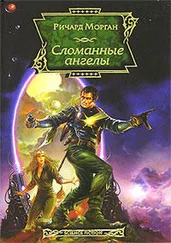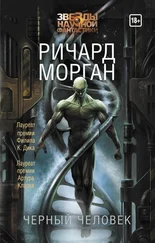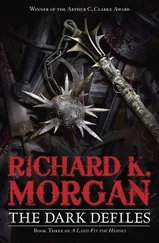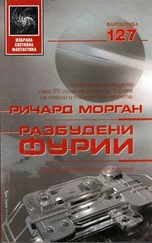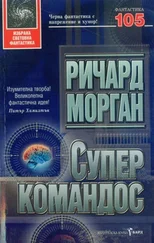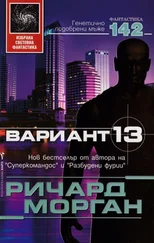She shrugged it off. Her body had never been subtle in the messages it sent.
But perhaps Manathan was right. There’d be plenty of time in the centuries to come to wean herself off the krin. Right now…
“…so in any real sense you would have to accept that it’s impossible for me to prove to you what I am. Demon is an arbitrary term, not so much a definition as an admission of a gap in a definitional framework, which…”
Right now, this was doing her head in.
Hanesh Galat seemed to be enjoying himself, though.
“But the Revelation clearly states—”
“Yes, your Revelation has textual criteria for defining a demonic entity, of course it does. But only by dint of a so-called deformation of nature, in other words via the acts said demonic entities indulge in and more important via human perception of the unnatural and negative impact of those acts on the human sphere and the physical world. So a demon that did not act in either the human sphere or the physical world, or at least did not give cause to perceive unnatural and negative impacts in those spheres, could not be defined as a demon as such. For that matter, though the textual authority is thinner, one could say the same of a similarly inclined angel.”
Galat blinked. “You mean to say that demons and angels could be mistaken for each other?”
“No, what I’m saying is that, just as with men, demons and angels cannot be effectively defined, in the temporal sphere at least, except by the actions they take in that sphere . That a lack of temporal agency on the part of either one leads to an impossibility of definition until some concrete action is taken and humanly perceived. And then, since this is the origin of definition, it is the act that must be judged, not the enactor.”
“But then, you’re also arguing—implying, anyway—that angels and demons are not immutable spirits !”
Senger Hald rolled his eyes. Lal Nyanar glanced surreptitiously up at the position of the declining sun.
“Well, if you follow that implication to its textual corollary in the Revelation at Hanliahg, yes,” Anasharal said smoothly. “But I ask you, is that such a bold step? I’m not suggesting anything that has not already been given considered debate in the Ashnal verses. The limitations on temporal knowledge are readily acknowledged, as is the imperfection of human senses in perceiving or even imagining a spiritual realm. Spirit is inherently unknowable from the context of the Earthbound soul, and so the Revelation, on its own admission, can only be partial.”
“There is the behavior of nonhuman spectators to consider, though.” Galat enumerated on his fingers. “Indirect intelligence that we achieve by observing the reactions of natural denizens in the animal kingdom. Dogs skulk and howl, spiders and other vermin may be attracted to—”
“Well, I think you’ll find that the horses did not react to me at all.”
“The horses were uncomfortable,” said Hald, patently seizing on something that might move the proceedings along.
“That was the trees.” Archeth, dismissive, moving to lean on the rear rail. Down on the main deck, the gathered men had evidently found other, more engrossing things to do and long ago dispersed to do them. “The burning spooked them. You’d get the same thing if the ship caught fire.”
“Well, burning the trees might be seen as a deformation of nature,” Galat allowed, but you could see that his heart wasn’t really in it.
“Do men not also burn wood for their own, natural purposes?”
“Yes, but the purpose is an intrinsic…”
So it went on until the sun fell below the trailing edge of the canvas shade and started getting in their eyes. Perhaps noticing this, Galat hurried through some concluding formal remarks, cited a verse or two from the Revelation at Shaktur, and then solemnly pronounced the Helmsman welcome among them as a Permitted Being.
The scribe signed off and dabbed the scroll dry.
For the others, it was like a spell breaking. Hald, Nyanar, and the ship’s officers piled to their feet, grimacing as they stretched cramped limbs, and headed down to the main deck. They left Hanesh Galat still seated, staring at Anasharal entranced.
“Fascinating,” he mused. “The implications. Fascinating. ”
“I take it we’re in the clear then,” Anasharal asked Archeth in High Kir. “We’ll have no more interference from these idiots?”
Galat glanced up at Archeth when he heard the Black Folk tongue, but any suspicion in his expression was softened by the blatant wonder that still held his face. Archeth made a small, reassuring gesture, then turned her attention to the Helmsman where it sat on the carpet, carapace gleaming dully now in the long rays of the late-afternoon sun. She drew closer. Followed the language shift.
“If you’re talking about the Citadel, then yes, we’re done. This one’s rank permits him to write opinion directly into the Quotidian canon. That’s not the same thing as the Revealed canon, so it’s not set in stone. It can be disputed at Mastery level. But that’s unlikely to arise. They’ve got a few other clerical fish to fry right now.”
“Just as well. Immutable spirits, indeed. Morons.”
It was the first time since the war that she’d seen a Helmsman treat the Citadel with anything other than complete disinterest. Curiosity prickled at her.
“I wouldn’t have thought it would matter that much to you. It’s not as if they can harm you in any way.”
“No, but a certain amount of cooperation will be important.”
“Cooperation in what?”
Long pause. “That’s not important right now, daughter of Flaradnam. The important thing is to get back to Yhelteth with all speed.”
She stood over the iron thing and suffered an overwhelming urge to kick it.
“Yes, you keep saying that. But you don’t explain why.”
“Why?” Abruptly, there was a snap in the Helmsman’s voice. “Because, daughter of Flaradnam, something dark is on its way. That’s why. And it’s nearly here.”
Hinerion , the Trelayne poet laureate Skimil Shend once wrote, is less a city in itself than some weak, far-flung echo of the capital it strives at every turn to imitate. It is a cultural and architectural cry that lacks conviction, the coarse cant of some mongrel urchin in the street who has perhaps heard Great Oratory somewhere and knows somewhat how to copy its more obvious features, but has neither the breeding nor the education to truly understand what it is he echoes. Worse yet, this is an urchin rubbing shoulders in the common mob with fellows whose blood origins, worse than uncertain, are most assuredly alien. For Hinerion belongs almost as much to the Southern Scourge as it does to the League. It is nominally in League territory, yes, but tell that to the dusky-faced multitude who throng its streets, jabbering in a variegated confusion of tongues where Naomic is no more honored in dominion than Tethanne; tell that to the imperial merchants whose vessels mob the harbor with their foreign flags and the mercenaries who with the thinnest of documentary justification come and go on the streets of what is called a League city as if they trod the tiled thoroughfares of Yhelteth itself. They tell me Hinerion is a frontier town, and it must be lived in as such, but from what I see about me at every turn, that frontier is as thin and seeping as the soiled bandage on a war wound that may never heal .
Ringil knew Shend—had in fact fucked him a couple of times in his youth, in curtained alcoves at fashionably seedy parties in the warehouse district—and he was inclined not to judge the poet’s vitriol too harshly. Like a lot of wordsmiths, Skimil was a delicate soul, exiled to Hinerion at the time of writing, and evidently not handling it very well. That old Trelayne story, the sudden trapdoor fall from grace. Jostled from your upriver residence on charges of seditious composition or some such shit, summoned to explain yourself before the Committee for Public Morals, and rapidly deserted by your up-until-then generous patrons—it must have been a rude awakening, and Ringil, who’d fallen foul of the Committee himself as a younger man, could well imagine the hole it would have punched in Shend’s brittle sense of superiority. The sudden, chilly desperation that might come whistling in through that hole. You’d write—allowing that that was your given talent—pretty much anything if you thought it might curry enough favor to banish that chill. And anti-Yhelteth rhetoric was a safe enough drum to beat if you wanted to ingratiate yourself with the great and the good in Trelayne. Add a judicious seasoning of sycophantic praise for the city and its pontificating elders, and who knew what might be achieved if your friends could only get what you’d written to the attention of the right people.
Читать дальше

